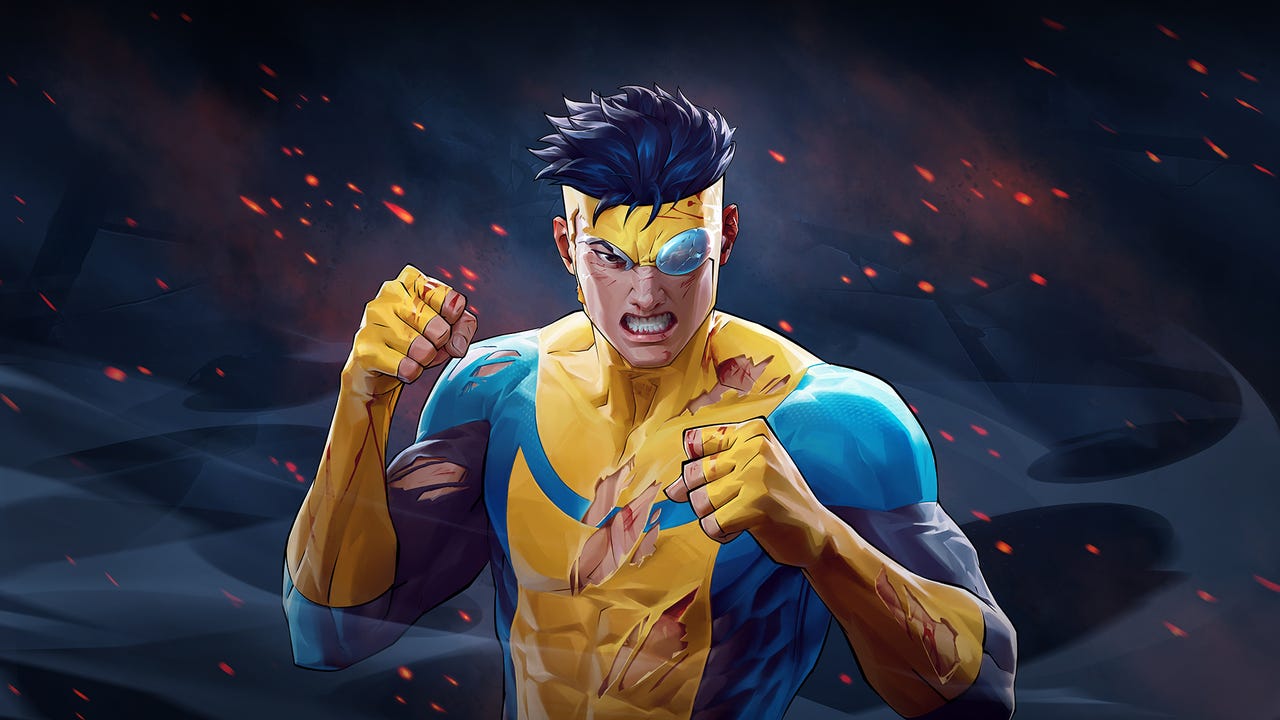Skybound spins up new fighting game studio Quarter Up
Look at what Skybound needs to mimic a fraction of the game industry’s power.
At a Glance
- Comic book company Skybound is unveiling an in-house game studio called Quarter Up founded by Double Helix Games veterans.
- Quarter Up is working on a fighting game called Invincible VS, based on the Skybound-published comic by Robert Kirkman.
Invincible and The Walking Dead production company Skybound Entertainment is expanding its video game interests with a new in-house game studio called Quarter Up. The studio's debut game will be Invincible VS, a tag-team fighting game based on Skybound founder Robert Kirkman's superhero comic Invincible, which gained widestream popularity after a successful animated adaptation debuted on Amazon Prime. The team is led by executive producer (and co-founder) Mike Willette, formerly of Double Helix Games, which developed the 2013 fighting game Killer Instinct.

A traditional entertainment company like Skybound forming its own game studio is an unusual sight to see in 2025. Skybound, like many owners of notable franchises, previously licensed its properties to game studios like Telltale Games, makers of The Walking Dead: The Telltale Series and its sequels. The company spent 2024 hiring a number of game industry executives like former Activision Blizzard vice president of product management Chris Paulson, seeming to signal an expanded interest in the video game industry.
It also ran a crowdfunding campaign for an unnamed triple-A game set in the world of Invincible. A Skybound spokesperson confirmed to Game Developer that the $678,000 it raised in the campaign is being used to support "multiple projects" at Quarter Up, including Invincible VS.
Paulson—now executive vice president and general manager of Skybound Games—explained to Game Developer in an interview that the company is pursuing an in-house game studio strategy in order to more productively bring its comic book properties to the world of video games. "There's just naturally barriers like contracts, relationships and approval rights" said Paulson in reference to the process of working with external licensors. He explained that because Quarter Up is an in-house studio, Kirkman is able to regularly drop in and review the game without any unusual go-between.
Skybound's decision for its fist foray into in-house game development to be a fighting game is also a surprising turn of events. The fighting game genre has been brutal (pun intended) for developers to break into. Even the multimillion dollar library of Warner Bros. characters couldn't help Multiversus developer Player First Games break into the competitive fighting game community (FGC)—a passionate but hard-to-attract audience fiercely attached to core franchises like Street Fighter and Mortal Kombat. Rare indie surprises like the Rivals of Aether series have managed to break through, but few big-budget competitors have landed a killing blow.
Breaking into this world means making a game that stands out, and like many fighting game designers, Willette has his personal bugbears about what it takes to pull that off. He said one major goal at the studio will be to attract new players not just through the lineup of Invincible characters, but also a "tag" system that gives players tools to break out of complex enemy combos by swapping characters. "There's other fighting games where it can be a 'slideshow' the minute you get touched," he said, referring to how successful combos are difficult to break out of in games like Street Fighter 6.
He rattled off a number of other features meant to create more interactivity between the two players, inevitably taking a breath and realizing he was about to start a GDC talk on fighting game design. "I could talk for hours and hours about this," he said. It's not just the coffee, I swear."
Skybound subsidiary Quarter Up will be leaning on outsourcing partners
A considerable question companies face when founding new game studios in high-GDP countries like the United States is one of cost management. Making a tag-team fighting game is no easy feat, and it can be difficult to turn a profit in this competitive genre.
Paulson and Wilette explained to Game Developer that Quarter Up will be tackling that problem by relying a relatively small core team of developers, while relying on outsourcing and co-development partners partners to scale up production. Wilette explained that Quarter Up's core team focuses on combat design animation, netcode, and other must-haves foundational skillsets for fighting game development.
It's another example of how in a tumultuous game market, company founders are sticking to smaller and smaller core teams while outsourcing labor that requires more headcount.
"In my view, the model of how to make a new game is you have to keep the core of the team small and efficient so that you can adapt to how people react to your product," said Paulson. "The last game I worked on was Diablo IV, and we had hundreds and hundreds of people, but we knew what the audience is for that."
"We don't exactly know what the audience is for Invincible VS yet, and we want to be able to grow with the audience, as opposed to trying to force a certain scale."


